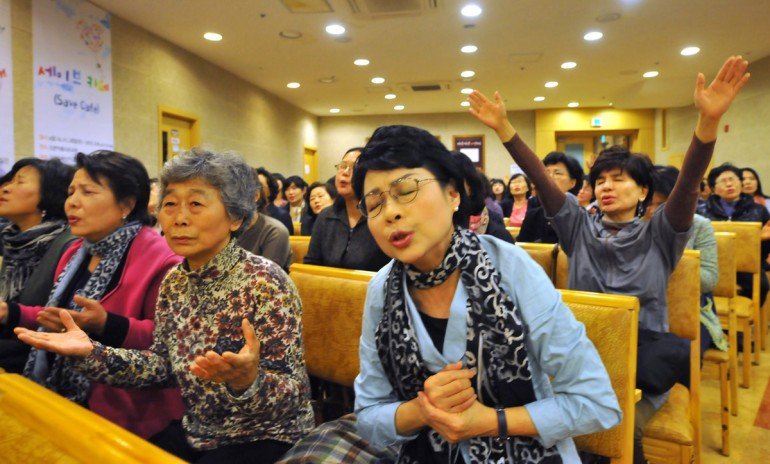Korea: The first handbook for the environmentalist bishop
 Korea: The first handbook for the environmentalist bishop
Korea: The first handbook for the environmentalist bishop
The Episcopal Commission for Justice and Peace has laid out the “Catholic Teachings on the Environment,” a compendium of Catholic thought on the ecosystem and its development
Faith in the defence of creation. The Episcopal Conference of South Korea has created a handbook for the Catholic environmentalist. Published by the Episcopal Commission for Justice and Peace, “Catholic Teachings on the Environment” is a compendium of Catholic thought on the ecosystem and its development. The economic and financial crisis - and the crisis that has struck humanity as a whole - “creates enormous and increasing damage to nature, causing great pain through unrestrained development and the theft of natural resources,” writes Bishop Mathias Ri Long-Hoon in his introductory note to “Catholic Teachings on the Environment,” recently published in South Korea. St. Francis is the model for safeguarding creation - patron saint of plants and animals, forerunner of environmentalism, and apostle of poverty and humility; he is revered not only as a moral model, but also as a defender of the environment.
The Poverello anticipated both the environmental movement with his love of creation and his conversations with plants and animals, and feminism, with his respect for women, exemplified by his relationship with Saint Clare. “The text is edited by the environmental section of the Episcopal Commission for Justice and Peace, led by Msgr. Ri,” reports Asianews, the news agency of the Pontifical Institute for Foreign Missions.
“It is a collection of texts ranging from Lumen Gentium to Gaudium et Spes, from papal documents on the environment to other writings from bishops’ conferences around the world. It is a sort of handbook for the Catholic environmentalist.” In his introduction, Archbishop Ri explains: “As the Catholic Church, we have the gift of being present all over the world. We must take our time and try to give our response to the problem of the environment, which is becoming more important for all of us. But we cannot give just one single response - we must try to understand the various realities around the world.
The universal writings collected in this text can be very useful for that.” The environmental issue is deeply felt in South Korea. Protective of their climate, Koreans protest very frequently - and with great vehemence – against unauthorized construction, deforestation, and military installations at sea. However, the unrestrained economic development that has struck the country makes it increasingly difficult to protect the ecosystem. In the Earth Day message delivered by the Episcopal Commission for Justice and Peace, the Korean bishops admonished: “We are too arrogant - we must return to caring for the Earth.” In fact, “like God, who loves all souls, taking care of the environment in itself gives us a chance to improve our lives. We must think of rivers, lakes, and animals as living beings, fully worthy of our highest consideration. We must all live together without arrogance.”
Msgr. Ri continues: “The main culprit of environmental crisis in the world, including Korea, is none other than man. We are the guilty ones: slaves to the economy, avarice, the desire to possess, and hedonism. We are slaves to indiscriminate development.” Thus, “these phenomena, which are nothing but sins, are born from our arrogant illusion that we can do everything and solve all problems.” This is one of the “many faces of the Tower of Babel.” It is a problem arising “from the denial of our responsibility: we should be the curators of the creation of God and all his beloved creatures.” The world, the Korean Bishops’ Conference stresses, “is shrouded in sorrow.” According to the 2011 UN State of the Future Report, the most pressing problem of the global village is climate change. “The report tells us that temperatures are rising and the sea is rising, through the melting of glaciers. And natural disasters are telling us that the situation is getting worse. We must think of rivers, lakes and animals, as living beings, fully worthy of our highest consideration.” In addition, natural disasters “raise a serious question for all believers, who wonder why God allows them to occur. But through these disasters, God prepares great graces for humanity. And that is what we must concentrate upon.”
Environmental disasters like the devastating tsunami in Japan “provide a new opportunity for us all. The faithful wonder why God has allowed them, but we should instead be focusing on the great graces prepared for the man by means of them.”
- Poverty and ignorance favour religious intolerance
- Dead wrong: Catholics must no longer support capital punishment
- Ireland visitation report: full text
- The 'Spotlight' on crimes against children
- New Year Message from the Archbishop of Canterbury
- The 'Spotlight' on crimes against children
- In England and Wales: 'Parishes are enriched by migrant communities'
- New Jersey nurses face job loss for refusing to assist abortions
- Bills put thousands of families at risk, warns archbishop
- Archbishop says cuts are hitting the vulnerable the hardest


 Votes : 0
Votes : 0









